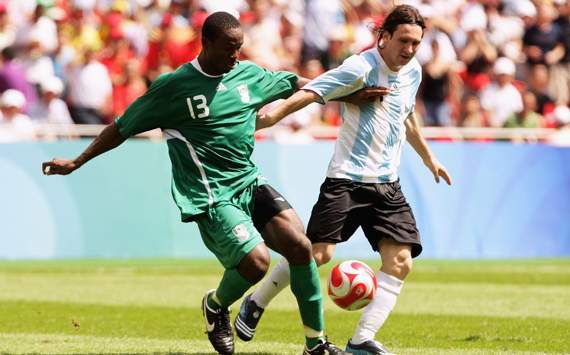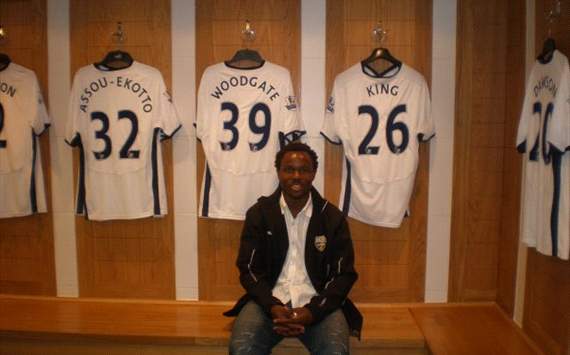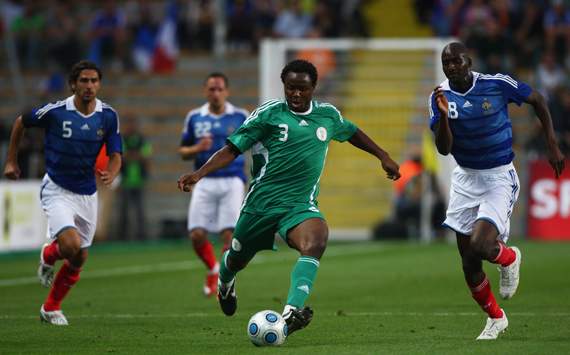
On the seventh anniversary of the Nigerian’s death, Goal revisit his unfulfilled potential and that of a wonderful collection of talents
Less than eight years after Nigeria contested the U-20 World Cup final against Argentina in 2005, they won the Africa Cup of Nations in South Africa, defeating Burkina Faso 1-0 in the final after a memorable run to Johannesburg.
The Afcon should have been the opportunity for that talented collective to flex their muscles and complete their route to the top on the continent’s grandest stage, yet only one player—John Obi Mikel—was named in Stephen Keshi’s squad, let alone play any kind of significant role as the Super Eagles clinched the continental gold.
This generation has some pedigree, but they ultimately fell by the wayside, despite promising so much in the Netherlands in 2005.
At the U-20 World Cup they qualified from a group containing Brazil, before beating Ukraine and the hosts en route to an All-African semi-final with Morocco. The quarter-final with the Dutch was a particularly gruelling encounter; the Nigerians eventually winning 10–9 on penalties.
The North Africans were overcome emphatically in the semis, before the Flying Eagles were eventually outdone in the final by a little fella called Lionel Messi!

Players from that tournament such as Radamel Falcao, Fernando Llorente, David Silva, as well as Messi himself have all enjoyed great success during their careers, yet it’s hard to say the same for many of the Nigerian squad, despite their impressive showing in the Netherlands, and a silver medal at the Beijing Olympics three years later…with the obvious exception of Mikel.
Taye Taiwo and Sani Kaita both represented Nigeria at the World Cup but peaked too soon, while Onyekachi Apam also advanced to the Super Eagles before injuries crippled his progress.
Isaac Promise is another who threatened to deliver only to ultimately fail to realise his immense…promise.
 Coming up against greatness | Adefemi jostles with Messi
Coming up against greatness | Adefemi jostles with Messi
Arriving in the Netherlands for the World Youth Championships, Olubayo Adefemi was one of the less heralded members of the squad.
Siasia’s original plans did not have him in the starting eleven. He made his first appearance for the team in the final group game against Switzerland, starting in a match that Nigeria needed to win. After impressing here, he kept his place, contributing a penalty in the shootout against the Dutch, and a crucial goal against Morocco.
Adefemi became a central component of the U-20 team, and then the Olympic team in 2008, opening the scoring in the emphatic semi-final victory over a strong Belgian side. The versatile defender made his debut for the Super Eagles senior side in 2009, setting up a goal for Michael Eneramo.
He eventually went on to win five caps, featuring in Nigeria’s memorable defeat of France in June 2009, and contributing to the West African giants’ qualification for the 2010 World Cup.
His career began with Bendel Insurance, before being picked up by Asaba-based side Delta Force in 2002. After some commendable domestic performances, he was signed by Israeli side Hapoel Jerusalem – it was here, in 2004, that Olubayo’s European odyssey began. He would eventually move on to three other sides in Israel, performing admirably, but failing to influence games in the same way that he could for the international side.
An assured season with Hapoel Bnei Lod led to a contract offer from Rapid Bucharest, three-time winners of the Romanian League.
Arriving some time after Giuleștenii’s latest league title, and two years after their Uefa Cup quarter-final appearance, Olubayo’s time in Romania was a disaster for the player. A dispute with club hierarchy led to his performances being few and far between. Eventually, he required an intercession from Fifa to annul his contract and permit him to move on.
 Posing in the Tottenham changing room | A fan of English football
Posing in the Tottenham changing room | A fan of English football
The next stop was Austria, where SC Rheindorf Altach offered refuge from the trauma of five months in Bucharest. This phase of Adefemi’s life was hardly more successful, his papers only arriving after the Austrian player registration window had closed. Thus, he never played for his new side, and watched in frustration as they were relegated from the Austrian Bundesliga.
Perhaps surprisingly, Olubayo was signed by the ambitious Boulogne to lend his services during their maiden season in Ligue 1.
It was early on during his time in France that I shared correspondence with Olubayo. He visited London, and enjoyed the White Hart Lane stadium tour, having photographs taken in Ledley King’s hallowed spot in the changing room. He confided, however, that were England to ever be his port of call, it would be Arsenal, and not Tottenham, that would be the preferred destination.
With Boulogne unsuccessful in their battle against relegation, Olubayo moved on again, this time to Skoda Xanthi, of Greece, his tenth club in a decade. It would be trite to suggest that he had finally settled, but Olubayo certainly impressed in Greece, with admirable contributions in the heart of Xanthi’s defensive efforts, as the club pushed for a Europa League spot. His marriage plans to girlfriend Folashade perhaps demonstrated added maturity following his travails across the continent.
In April 2011, Olubayo intended to take advantage of a week off by returning to Lagos to finalise his wedding plans. He never made it to the airport; losing control of his car near Kavala, he was killed in the collision.
Following his death, teammates spoke of a warm character with a fantastic sense of humour. It was a personality evident in his exuberant celebrations and committed performances. Christopher Katongo, who captained Zambia to their 2012 Afcon victory, was a team mate of Adefemi’s at Xanthi. He described his friend as a good man, who was well liked, and was ‘as a brother’ to the Chipolopolo skipper. He is still fondly remembered in Greece for his dedicated and wholehearted play.
Xanthi have retired the number 13 shirt he wore there, and for many of his previous clubs.
Olubayo was a young man when he died, just 25, only approaching his peak years as a player, and beginning to arrive at his most effective for club and country. His youth team of 2005 was taken into the hearts of Nigerians, they succeeded in forging and sustaining a relationship with the fanbase, one that existed above and beyond their accolades on the pitch.
 Representing the Super Eagles | Adefemi was approaching his peak
Representing the Super Eagles | Adefemi was approaching his peak
Ultimately, Nigeria did achieve the success in 2013 that many had tipped them for in 2005, only it was a different collection of players who ultimately clinched the continental gold.
Youngsters such as Kenneth Omeruo, Ahmed Musa and Victor Moses stepped into the team and demonstrated the kind of quality that few of the ’05 generation after showed during their senior career, and while that side ultimately struggled to build on their success in South Africa, yet more youngsters have emerged, yet more starlets arrive.
As the heroes of tomorrow take to the stage, picking up the shirts their predecessors once wore, we are reminded—again—that football…African football…retains its propensity for moving on.

Be the first to comment